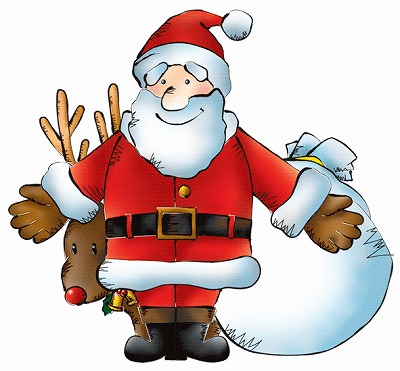 |
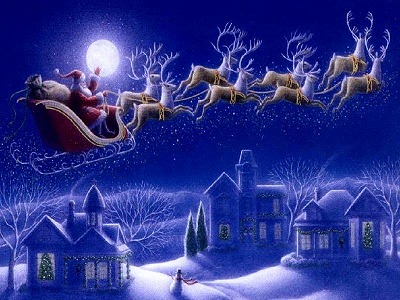 |
| I'm talking about topics of the season today. | |
| 今日は季節の話をしようと思います。 | |
| Christmas is coming soon. | |
| クリスマスがもうすぐやってきますね。 | |
| I don't celebrate Xmas, but I thought I wonder what Santa Claus is doing in the world. |
|
| 私はクリスマスを祝いませんが、世界各国ではサンタクロースは何をするのかなあと思いました。 | |
I wonder 〜 〜かなあ 〜かどうか知りたいなあ と言うような意味を持つ |
|
| Then I searched for information about him on line. |
|
| それでサンタクロースについてインターネットで調べてみました。 | |
| In Iceland, there are 13 fairies corresponds to Santa Claus. | |
| アイスランドには、サンタクロースに相当する13人の妖精たちがいます。 | |
corresponds to 〜 〜に相当する |
|
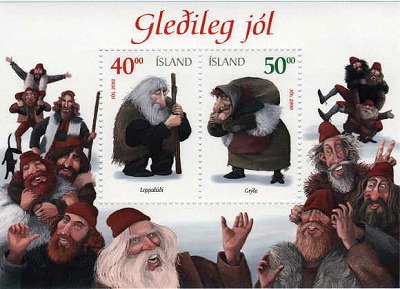 |
|
| Each of them has a clear character, for example spoon licker, dish licker,
pot licker, sausage thief and so on. |
|
| 妖精はそれぞれがはっきりした性格を持っています、例えばスプーンなめ野郎、皿なめ野郎、 鍋なめ野郎、ソーセージ泥棒野郎などなど。 |
|
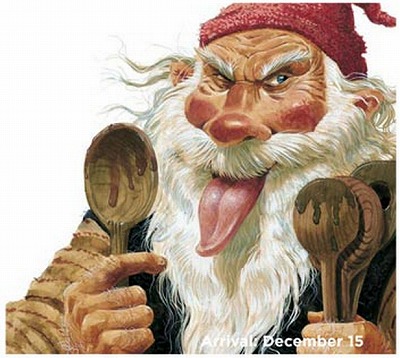 |
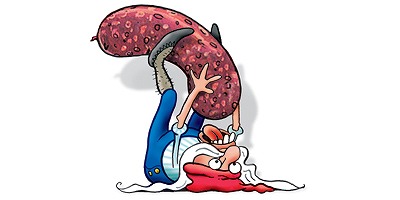 |
| They have lived in Mt. Esha for 5000 years. |
|
| 妖精たちは5000年間、エーシャ山に住んでいます。 | |
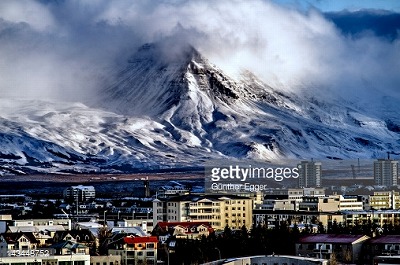 |
|
| They climb down from Mt. Esha on December 12th one by one. | |
| 妖精たちは12月12日にエーシャ山から1人ずつ降りてきます。 | |
| They give some sweets to good children, and they put potatos in bad children's shoes. |
|
| 妖精たちはよい子にはお菓子を、悪い子にはじゃが芋を靴の中に入れます。 | |
| All the failies assembled on 24th and they climb to the mountain one by one. |
|
| そして24日には全員が勢揃いし、一人ずつ山を登っていくのです。 | |
assemble(アセンブル) 動詞 〜を集める、集まる assembly(アセンブリー) 名詞 集会、会合、朝礼 |
|
| In Holland, there are 2 Chrismasday , so kids get presents on December both of 6th and 25th. |
|
| オランダでは2回のクリスマスがあります、ですから子供たちは12月6日と25日の両方でプレゼントをもらいます。 | |
Holland(ハランド)オランダ 公式にはthe Netherlands Dutchはオランダの、オランダ語、オランダ人の意味 |
|
| Because 6th is St. Nicholas's Day. | |
| なぜならば、6日は聖ニコラスの日だからです。 | |
| Who is St.Nicholas ? |
|
| 聖ニコラスとは誰なんでしょうか? | |
| He was bishop lived in Myra (now Turkey), he was guardian deity of kids. | |
| 彼はマイラ(現在のトルコ)に住んでいた司教で、子供の守護神とされています。 | |
| St.Nicholas comes on December 6th , St.Nicholas's Day, in Most European countries. |
|
| ほとんどのヨーロッパの国々では、12月6日の聖ニコラスの日に、聖ニコラスがやってくるんです。 | |
| Then, how about Switzerland? | |
| ではスイスではどうでしょうか? | |
| Nicholas comes with Schmutzli, his attendant, by donkey from forest. | |
| ニコラスは森からシュムッツリというお供を連れて、ロバで来ます。 | |
| He doesn't climb down the chimney by a flying sled pulled reindeers from North Pole. |
|
| 彼は北極からトナカイのひく、そりで、煙突を降りてやってこないんです。 | |
| It's so different from our common sense, in Japan. | |
| それは私達日本人の常識とは大分違いますね。 | |
| Nicholas wears red gown with red hood, Schmutzl wears brown or black gown. |
|
| ニコラスは赤いフードつきの赤いガウンを着て、シュムッツリは茶色か黒色のガウンを着ています。 | |
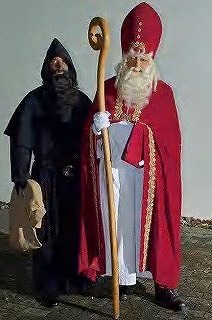 |
|
| Nicholas has a whip, Schmutzl carries a white bag on his back and has a big thick book. |
|
| ニコラスはムチを持ち、シュムッツリは背中に白い袋を背負い、ぶ厚い大きな本を抱えています。 | |
| The book is a list about children's names.. | |
| その本は子供たちの名前のリストです。 | |
| Nicholas judges whether each of them was good child or bad child for a year. |
|
| whether (ウェザー) 〜かどうか | |
| ニコラスは子供たちがそれぞれ、この1年間、いい子かだったか悪い子だったかを審査します。 |
|
| He gives a small mandarin orange and nuts for good child. Because mandarin was expensive in the past, and nuts is season food. |
|
| . | |
| そしてニコラスはいい子には、小さなみかんとナッツをくれます。 なぜならば、みかんは昔、高価なもので、ナッツは季節の食べ物だからです。 |
|
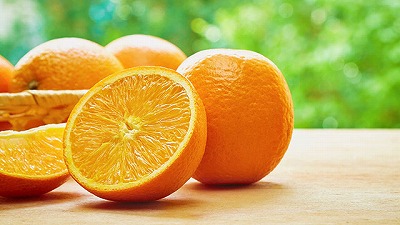 |
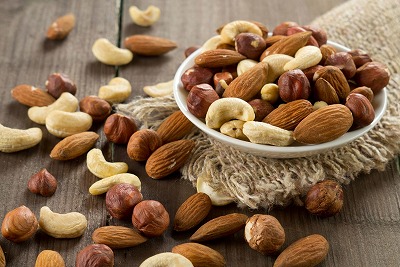 |
| And he punishes for bad children. The punishment is hitting them with whip in most town of Switzerland. |
|
| そして悪い子供たちには、お仕置きをします。 ほとんどのスイスの町では、お仕置きは鞭でたたくというものです。 |
|
| But especially, the punishment in Basel is very scary. | |
| でも特にバーゼルでのお仕置きはとても怖いのです。 | |
| Basel is located near"Black Forest"(Schwarzwald) in Germany. | |
| バーゼルはドイツの黒い森(シュバルツバルト)の近くにあります。 | |
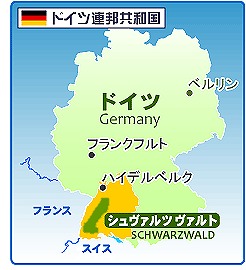 |
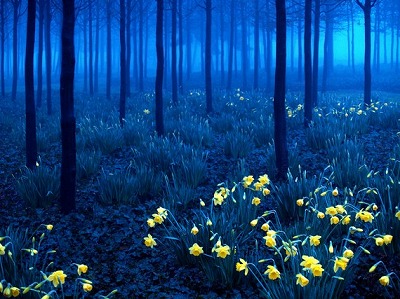 |
| So Nicholas comes from Black Forest, he put some bad children in the white bag, then kidnap them to Black Forest. |
|
| それでニコラスは黒い森からやって来て、悪い子供たちを白い袋に詰めて、黒い森にさらっていくのです。 | |
| The white bag is full of bad children, not presents. | |
| 白い袋にはプレゼントではなく、悪い子がぎっしり詰まっているんですね。 | |
| After he takes some bad children, what is he doing them? | |
| 悪い子たちを連れて行った後、ニコラスは子供たちをどうするのでしょうか? | |
| He leaves the children out in the Black Forest. | |
| ニコラスは子供たちを黒い森に放っておきます。 | |
| So that means, children die from cold there in winter. | |
| ということは、子供たちは冬、そこで凍死するのです。 | |
| Parents threaten children, "Be a good child, or else you'll be punish by Nicholas." |
|
| 親は子供たちに「いい子にしていないと、ニコラスにお仕置きされるよ」と脅しをかけます。 | |
threaten(スレトゥン)〜をおどす、脅迫する threat(スレット)脅迫、脅威、おどし |
|
| In Itary, witch is equal to Santa. | |
| イタリアでは、魔女がサンタに相当します。 | |
be equal to 〜(イクォール) 〜に相当する |
|
| She gives some sweets for good children and gives coal for bad children on January 5th. |
|
| 魔女は1月5日に、いい子にはお菓子をくれ、悪い子には石炭をくれます。 | |
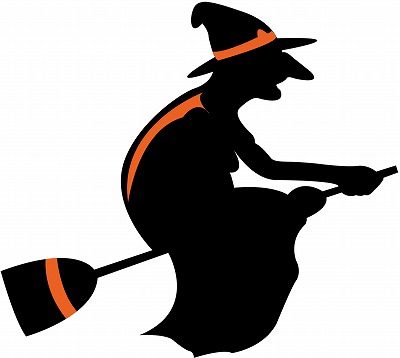 |
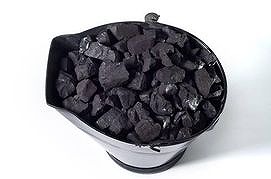 |
| In Venezuela, they have a funny custom at Christmas. | |
| ベネズエラでは、クリスマスに面白い習慣があります。 | |
| The road is closed from early morning, people go to church for Christmas
Mass during skateboarding and rollerskating. |
|
| 道路は早朝から通行止めになり、人々はミサに参加するために、 スケートボードやローラースケートで教会へ向かうんです。 |
|
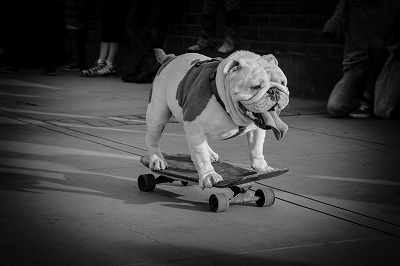 |
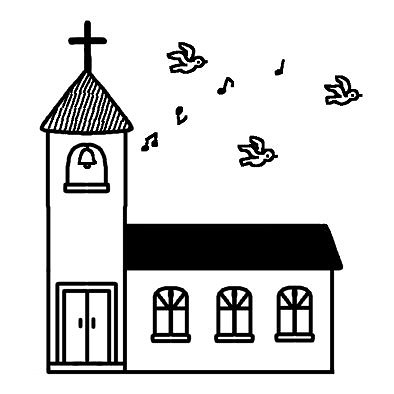 |
| They shout together then,"Jesus is born ! Jesus is born !" | |
| その時、人々はみんなで「イエス様が生まれる! イエス様が生まれる!」と叫びます。 | |
| That is a strange scene, isn't it? | |
| それって不思議な光景ですよね? | |
| Next I talk to you about the relation between Santa and Coca-Cola in America. | |
| 次にサンタとアメリカのコカ・コーラの関係について話します。 | |
| Coca-Cola company was started in 1892. | |
| コカ・コーラ社は1892年に設立されました。 | |
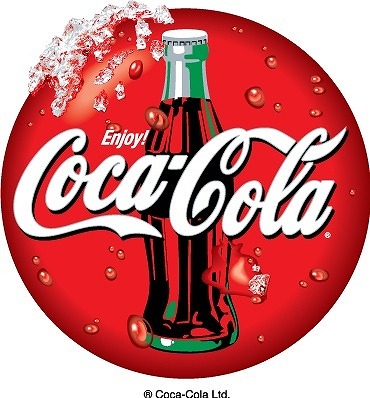 |
|
| In those days, the company paid lots of money for ad, but it had no effect, especially women and kids. |
|
| その当時、コカ・コーラ社は広告にたくさんのお金をかけていましたが、 効果がありませんでした、特に女性と子供に。 |
|
ad 広告 advertisement(アドヴァタイズメント)の略 |
|
| Because it had a bad image including cocaine and caffeine. | |
| なぜならば、コカ・コーラには、コカインやカフェインを含んでいるという悪いイメージがあったからです。 | |
| That's why, Santa character was used to develop children's market in 1931. | |
| そういうわけで、1931年にサンタクロースのキャラクターが子供市場を開拓するために、起用されたのでした。 | |
| And Coca-Cola company made a catch copy "Wherever I go"in 1943. | |
| そしてコカ・コーラ社は1943年に「どこへでも行きますよ。」というキャッチコピー(宣伝文)を作りました。 | |
| Wherever kids live, Santa will go, and wherever human live, Santa will go selling. |
|
| 子供たちのいる所ならどこへでもサンタは行くよ〜、 人間のいる所ならどこへでもサンタは売りに行くよ〜。 |
|
| There were various image for Santa before Coca-Cola company used Santa character. |
|
| コカ・コーラ社がサンタのキャラクターを使うまでは、いろいろなイメージがサンタにはありました。 | |
| Santa wearing red clothes and white beard became famous in the world, because of Coca-Cola ad. |
|
| コカ・コーラの広告によって、赤い服を着て、白ひげをたくわえたサンタが世界中で有名になったのです。 | |
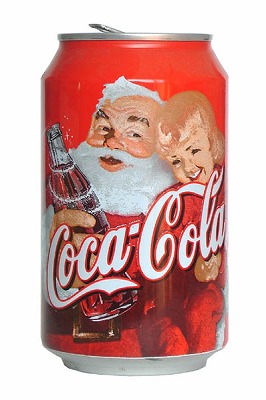 |
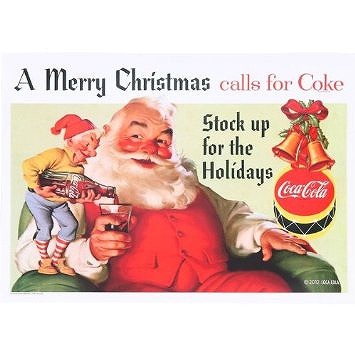 |
| And lately in Switzerland, some children believe that Nicholas climb down the chimney by a flying sled pulled reindeers from North Pole, too. |
|
| そして最近ではスイスでも、ニコラスは北極からトナカイの曳く空飛ぶソリに乗ってきて、 煙突を降りてくると信じている子供も出てきたらしいです。 |
|
 |
|
| By the way, do you know how many reindeers pull a flying sled ? | |
| ところで、何頭のトナカイが空飛ぶそりを引くのか、知っていますか? | |
| There are 8 reindeers and 1 special reindeer. | |
| 8頭のトナカイと1頭の特別のトナカイがいます。 | |
| Each of them has a name. | |
| それぞれのトナカイには名前があるんです。 | |
| Dasher, Dancer, Prancer, Vixen, Comet, Cupid, Donner, Blitzen, and the nineth reindeer is the famous Rudolph, Red-Nosed. |
|
| ダッシャー、ダンサー、プランサー、ヴィクセン、コメット、キュピッド、ダンナー、ブリッツェン、 そして9番目のトナカイがあの有名な赤鼻のトナカイのルドルフなのです。 |
|
| Rudolph leads 8 reindeers and runs the head of them. | |
| ルドルフは8頭のトナカイを率いて、彼らの先頭を走るのです。 | |
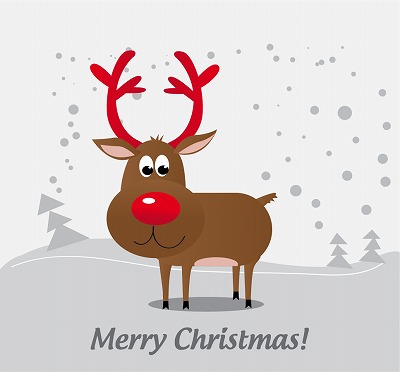 |
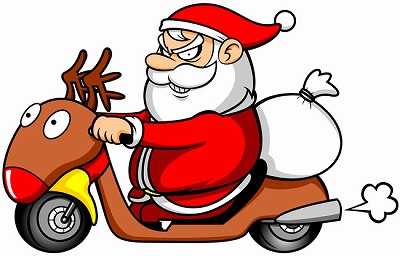 |
| When I was talking about reindeer, our American teacher sang the song of reindeer. |
|
| 私がトナカイについて話していた時に、私達のアメリカ人の先生はトナカイの歌を歌いました。 | |
| To my surprise, he remembered all the reindeer's name. | |
| 驚いたことに、先生は全部のトナカイの名前を覚えていたんです。 | |
| I asked him,"Do the most American chirdren remember them ?" | |
| 私は先生に「アメリカのほとんどの子供たちはそれらを覚えているんですか?」とききました。 | |
| He said "No, not everyone does." | |
| 先生は「みんながみんな覚えているわけではないですよ。」と言いました。 | |
| He talled us about Christmas in his childhood. | |
| 先生は私達に子供の時のクリスマスについて話してくれました。 | |
| He played the part of Rudolph at Christmas play. | |
| 先生はクリスマス劇でルドルフを演じました。 | |
| He made a twinkle Red-Nose putting small light inside. | |
| 小さな電球を入れた光る赤鼻を作りました。 | |
| What a great idea ! After all, our teacher has been funny since his childhood! |
|
| 何て素晴らしいアイデアでしょうか! やっぱり私達の先生は子供の時から面白い! |
|
 |
|
| 2015年12月17日(木) | トップページへ戻る |